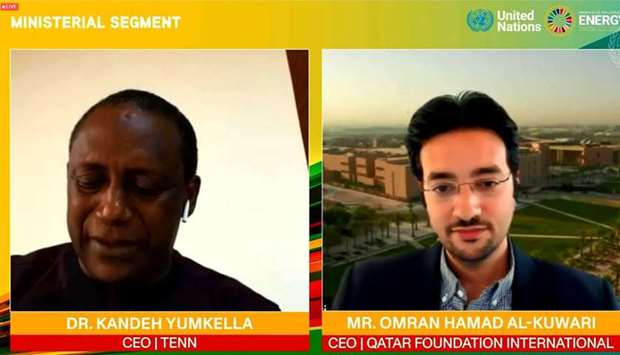Qatar can bridge the global North-South divide and take a key role in driving forward the “difficult conversation” about how to tackle climate change, a Qatar Foundation (QF) sustainability expert told an international energy-focused United Nations event.
Omran Hamad al-Kuwari, CEO of Qatar Foundation International and a climate technology and energy transition adviser, emphasised that rising temperatures will affect the Gulf more than many other regions, meaning its nations have a “vested interest” in taking action to mitigate global warming.
Speaking at the Ministerial Thematic Forum on energy transitions – held ahead of the UN’s High-Level Dialogue on Energy, which will take place in September – he also explained how Qatar was ahead of the global curve in committing to building a more sustainable society, with QF at the forefront.
“In Qatar, we see ourselves as being part of a place where the difficult conversation between the Global South and the Global North on climate change and the energy transition can happen,” al-Kuwari told the forum. “With our geography, our leadership, and our resources, we feel we can move this conversation forward in a responsible manner.
“The green transition is something the world needs to not only accept, but embrace, and in Qatar we hope we are doing our part by taking advantage of the resources we have in a responsible manner. At Qatar Foundation, we had already started to do this before climate change became part of the daily conversation. We always knew our role was to help transition our society to a knowledge-based society. And the reason why we want to support the green transition is because it’s the right thing to do.
“Ironically, although we are from an oil and gas region, we are going to be affected more than many other regions. Every one-degree rise in temperatures globally will mean we feel a three-degree rise in the Gulf region. We will be directly affected, so we have a vested interest to mitigate and manage this, to adapt, and to use our resources and skills.”
Al-Kuwari, who is a doctoral researcher at UCL Institute for Sustainable Resources in the UK, also explained that non-profit organisations – such as QF – have a “unique role” in the green energy transition, saying: “We can work with governments and with the private sector, and we’re well-positioned to bridge innovation gaps.”
And he spoke about how, while working in the oil and gas industry, he began to “dive deep into energy transition and decarbonisation, and what it means for the future of the world”.
“We’ve had many energy transitions over the last 200 years: wood to coal, oil to gas, the shift to renewables,” he said. “But this transition is different; it’s purposive.
“It was important for me to understand where technology and economics are going, and do whatever I can as an individual to help close the gap between academia and business and policy. There will be winners and losers, and we all have a role to play in reducing the number of losers as much as possible,” added al-Kuwari.

